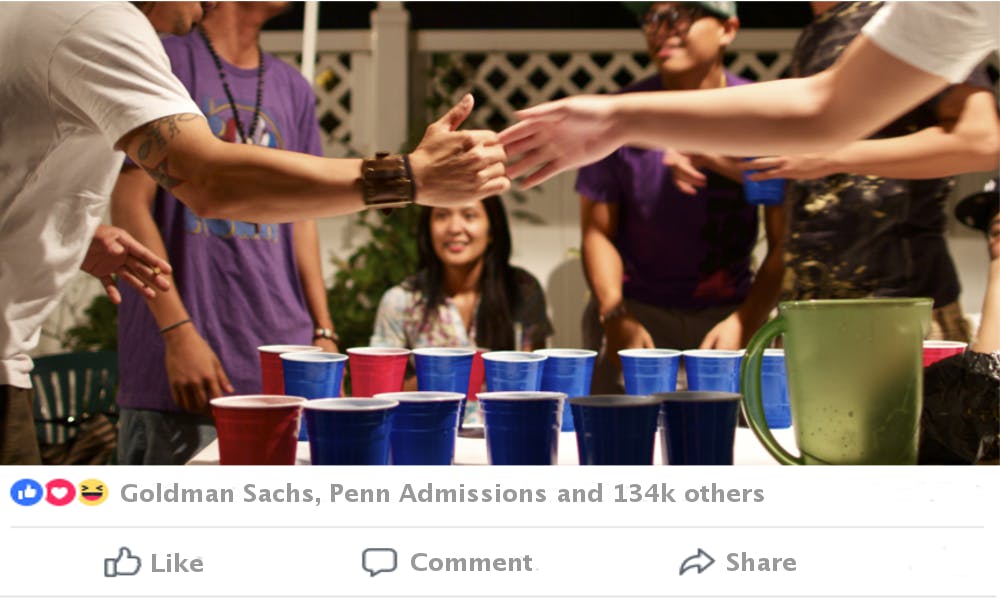“A woman shouldn’t have to be modest to be respected,” is printed under a photo series of Instagram posts on one of my close friend’s public accounts. In the pictures, she is boasting a beautiful smile … and some lingerie. While I wholeheartedly echo her sentiment, and wish I had the confidence to rock the same political statement, my first thought when I viewed the pictures wasn’t solidarity, but fear for what an employer would think if they checked her account.
During the college application process, one of my high school teachers asked if I had any questionable social media accounts. Though I still don’t know how to use Facebook, and my Instagram is full of boring pictures of my face where every caption is a pun, the warning still rang loud and clear in my head. Some of my friends made brand new accounts with pristine headshots as their Facebook profile photos, tucking away their worn-out Facebook pages until after admission.
Though social media is meant to be an additional space for connecting to other people, sharing thoughts and creativity, and making yourself available to more people than you’ve ever been able to before, employers and colleges don’t want you to make yourself available in the “wrong” ways.
Penn's Office of Admissions has insisted that it does not routinely review applicant’s social media accounts, though they credit this decision more to the logistical obstacle of checking thousands of high schoolers’ Facebook pages, rather than “the sanctity of privacy.”
As someone born in 1999, my entire adolescence has been inundated with social media, and I’ve had an online presence since I was around 12 years old. At 12 years old, I didn’t know the very real and consequential ramifications that can spur off of something as simple as posting the wrong photo. As an opinion columnist, I attach my name to a very public opinion every week, yet I am somehow more nervous for a potential employer to scroll through my Twitter, a recreational space for my thoughts, than I am my Daily Pennsylvanian articles.
My question is, what am I so afraid of? I don’t post absurd or obscene pictures, but I still find myself worrying. We’ve all heard the stories — someone gets accepted to the college of their dreams or to the perfect job, and then their position is revoked on the basis of a Facebook photo of them holding a Red Solo cup. While proof of underage drinking or obvious hate speech on someone’s social media is very different than a teacher being fired for posting a photo with a glass of wine in her hand, to what extent can we be expected to censor the content of our posts?
But what about my friend? What would a hiring officer at an engineering office think about my friend’s body-positive lingerie photos? Should employers have control over how much of their employees’ bodies are on display on their own social media accounts? If employers have the power to put a limit on something as personal as your skin, how much farther can the restrictions go?

SEE MORE FROM SOPHIA DUROSE:
My Twitter is nothing but political tirades and tweets about my own articles. Sometimes I question if I should make that account more of a neutral presence. Twitter is known for its political environment though, and if our president can make questionable tweets, why can’t I?
People like my mother don’t have social media accounts, and when she was applying to jobs last year, she didn’t have a Facebook link or Twitter handle to put on her application. She worried whether this would be to her detriment, and if making a clean social media account would bolster her chances at getting the position. Lo and behold, she did not get the job or make a Twitter account. To this day, she wonders if the two are related.
I don’t think social media is going away anytime soon. If employers continue the trend of checking up on applicants’ social media presences, I think it will only become even more imperative that we find the right boundaries. If I want to be brave like my friend and post a photo of myself in a bra as a message of body positivity, I should be able to do so without fearing that my university or boss will punish me.

SOPHIA DUROSE is a College sophomore from Orlando, Fla. studying English. Her email is sdurose@sas.upenn.edu.









